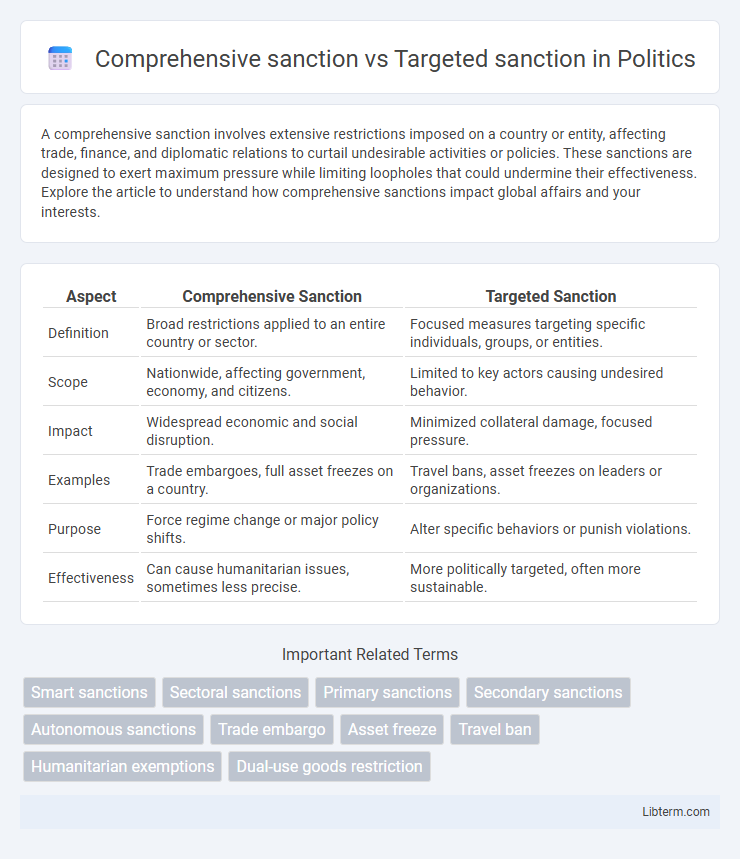A comprehensive sanction involves extensive restrictions imposed on a country or entity, affecting trade, finance, and diplomatic relations to curtail undesirable activities or policies. These sanctions are designed to exert maximum pressure while limiting loopholes that could undermine their effectiveness. Explore the article to understand how comprehensive sanctions impact global affairs and your interests.
Table of Comparison
| Aspect | Comprehensive Sanction | Targeted Sanction |
|---|---|---|
| Definition | Broad restrictions applied to an entire country or sector. | Focused measures targeting specific individuals, groups, or entities. |
| Scope | Nationwide, affecting government, economy, and citizens. | Limited to key actors causing undesired behavior. |
| Impact | Widespread economic and social disruption. | Minimized collateral damage, focused pressure. |
| Examples | Trade embargoes, full asset freezes on a country. | Travel bans, asset freezes on leaders or organizations. |
| Purpose | Force regime change or major policy shifts. | Alter specific behaviors or punish violations. |
| Effectiveness | Can cause humanitarian issues, sometimes less precise. | More politically targeted, often more sustainable. |
Introduction to Economic Sanctions
Comprehensive sanctions impose broad restrictions on an entire country's trade and financial activities, aiming to pressure governments by isolating their economies. Targeted sanctions concentrate on specific individuals, entities, or sectors, minimizing collateral damage while maximizing political impact. Both types of sanctions serve as strategic tools in international relations to influence state behavior without resorting to military action.
Defining Comprehensive Sanctions
Comprehensive sanctions impose broad restrictions on an entire country or regime, often including trade embargoes, financial prohibitions, and travel bans aimed at crippling the target's economy or governance. These sanctions differ from targeted sanctions, which focus on specific individuals, entities, or sectors to minimize humanitarian impact. Defining comprehensive sanctions involves understanding their extensive scope and potential for widespread economic disruption to compel policy changes.
Defining Targeted Sanctions
Targeted sanctions, also known as smart sanctions, are measures aimed specifically at individuals, entities, or sectors responsible for undesirable activities, minimizing harm to the general population. Unlike comprehensive sanctions that impose broad restrictions on an entire country's economy, targeted sanctions focus on freezing assets, restricting travel, and limiting business dealings of key figures or organizations. This precision enhances effectiveness in addressing issues such as terrorism, human rights abuses, and corruption while reducing collateral damage to civilians.
Historical Context and Evolution
Comprehensive sanctions emerged prominently during the Cold War era, designed to isolate entire nations economically and politically, as seen in the embargoes against Cuba and apartheid South Africa. Targeted sanctions evolved in the 1990s, focusing on specific individuals, entities, or sectors to minimize humanitarian impacts, exemplified by UN measures against Taliban leaders and Iraqi officials. The shift reflects an increasing emphasis on precision in sanctions enforcement to balance geopolitical pressure with international legal and ethical standards.
Mechanisms of Implementation
Comprehensive sanctions involve broad restrictions applied to an entire country, including trade bans, financial blockades, and embargoes, enforced through customs controls, export licensing, and financial institution monitoring. Targeted sanctions focus on specific individuals, entities, or sectors, utilizing asset freezes, travel bans, and restrictions on financial transactions, implemented via intelligence sharing, watchlists, and regulatory compliance mechanisms. Both mechanisms rely on international cooperation, legal frameworks, and technological tools such as transaction screening systems to ensure effective enforcement and minimize circumvention.
Effectiveness in Achieving Policy Goals
Comprehensive sanctions, which impose broad restrictions on entire economies, often lead to severe economic disruption but risk harming civilian populations and prompting unintended consequences. Targeted sanctions, focusing on specific individuals, entities, or sectors, enhance precision in pressuring decision-makers while minimizing collateral damage, thereby improving compliance and international support. Studies show targeted sanctions generally achieve policy goals more effectively by creating leverage without widespread humanitarian costs.
Humanitarian and Economic Impacts
Comprehensive sanctions impose broad trade and financial restrictions on entire countries, often leading to severe economic downturns, widespread unemployment, and critical shortages of food, medicine, and essential services, significantly exacerbating humanitarian crises. Targeted sanctions, by contrast, focus on specific individuals, entities, or sectors, aiming to minimize collateral damage while maintaining pressure on political elites or culpable groups, thereby reducing negative impacts on the general population's access to basic needs. Studies on economic consequences show that targeted sanctions better preserve a country's civilian economy and humanitarian aid flow, mitigating widespread poverty and malnutrition compared to comprehensive measures.
Legal and Ethical Considerations
Comprehensive sanctions impose broad restrictions on entire countries or sectors, raising legal concerns about proportionality and potential violations of international human rights law. Targeted sanctions focus on specific individuals, entities, or activities, aiming to minimize collateral damage while ensuring compliance with due process rights and ethical standards. Both types require rigorous legal frameworks to balance effectiveness with respect for sovereignty and humanitarian principles.
Case Studies: Successes and Failures
Comprehensive sanctions, such as those imposed on Iraq in the 1990s, often led to widespread humanitarian crises without effectively changing government behavior, illustrating major failures. Targeted sanctions, exemplified by measures against Iran's nuclear program, have shown more success by focusing on specific individuals and sectors, minimizing collateral damage while maintaining pressure. Case studies reveal that targeted sanctions enhance compliance and diplomatic engagement, whereas comprehensive sanctions frequently provoke international criticism and unintended socioeconomic harm.
Future Trends in International Sanctions
Future trends in international sanctions indicate a shift from comprehensive sanctions, which broadly impact entire countries, to more precise targeted sanctions aimed at specific individuals, entities, or sectors. This approach minimizes humanitarian fallout while maximizing pressure on decision-makers responsible for objectionable policies or actions. Advances in data analytics and international cooperation are enhancing the effectiveness and enforceability of targeted sanctions, emphasizing smart, calibrated measures over blanket restrictions.
Comprehensive sanction Infographic

 libterm.com
libterm.com